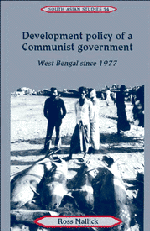Book contents
Summary
A considerable literature has analyzed the nature of Indian rural elite control over village government institutions. It has shown how this rural elite is able to influence government policy and its implementation at the state and national level. The central theme of the literature has been that control by the landed high caste–class elite has effectively prevented the democratization of rural politics and the delivery of development aid to the lower classes. The literature is divided, however, on the extent to which universal franchise will enable the shift of political control to the more numerous lower-class voters. In this respect the Communist experiment with the Panchayats in West Bengal is important for showing the possibilities and constraints on attempting rural change in favor of the lower classes through the Panchayats. As the most radical state government in India, its Panchayat experiment indicates the extent to which change is possible in Indian democracy, and the problems in attempting devolution of power to the villages and the lower classes.
Since the publication of the Indian government's first five year plan in 1953, the Planning Commission's recommendation for devolution of power to village councils or Panchayats for the purpose of rural development implementation has been a matter of controversy. The various attempts of the central and state governments in this direction proved unsuccessful in distributing the benefits of development aid to the lowest classes in the rural areas. In a system of acute inequality, the dominant landed classes used the Panchayats they controlled to corner development aid for themselves thereby helping to enhance their own positions.
- Type
- Chapter
- Information
- Development Policy of a Communist GovernmentWest Bengal since 1977, pp. 124 - 170Publisher: Cambridge University PressPrint publication year: 1993
- 1
- Cited by

